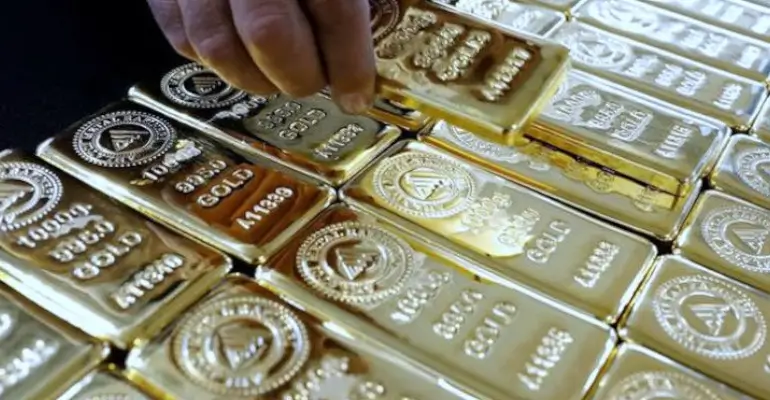Reporting Precious Metals Like Gold: IRS Rules, Thresholds

Under U.S. tax law, individuals and entities are required to report transactions involving precious metals to the IRS, particularly large transactions that exceed specified thresholds. This includes the mandatory use of IRS Form 1099-B to record sales of commodities such as gold, silver, platinum, and palladium. The form is essential in tax reporting, as it details the nature and volume of these transactions.
Additionally, bullion dealers have specific reporting obligations for certain sales: gold bars over 1 kilo (32.15 troy ounces) with a minimum .995 fineness, silver bars over 1,000 troy ounces with a .999 fineness, platinum bars over 25 troy ounces with a .9995 fineness, and palladium bars over 100 troy ounces with a .9995 fineness, as well as transactions involving more than 25 coins of 1 ounce Gold Krugerrands, Gold Maple Leafs, or Mexican Onzas.
Non-compliance with these reporting requirements can lead to financial penalties, the severity of which depends on the nature and extent of the reporting error. Understanding and adhering to these regulations is crucial to avoid legal complications and ensure compliance with U.S. tax laws.
Importance of Precious Metals Reporting
Reporting precious metal transactions is vital for maintaining financial system integrity. It plays a key role in preventing illegal activities such as money laundering and tax evasion. Accurate reporting is also critical for legal compliance, particularly concerning capital gains tax. The type of precious metal and the nature of the transaction significantly influence the tax implications. Additionally, such reporting promotes market stability by ensuring transparency in trading activities, which affects investor confidence and market pricing.
Purchase Restrictions For Precious Metals
Purchasing precious metals involves adhering to specific restrictions. Anti-Money Laundering (AML) and Know Your Customer (KYC) regulations require identity verification for transactions exceeding certain thresholds. There are also geographical restrictions due to varying international treaties and sanctions. Buyers must provide government-issued identification and maintain transaction records, ensuring compliance and traceability of their precious metal purchases.

Precious Metal Reporting Thresholds
The thresholds for reporting precious metal transactions are periodically reviewed and adjusted by tax authorities. These adjustments are in response to market conditions, regulatory changes, and factors like inflation. The thresholds differ for various precious metals, reflecting their market value and liquidity. Understanding these thresholds is essential for compliance and accurate tax reporting.
These reporting obligations are particularly detailed for certain types of sales and purchases involving bullion. For instance, bullion dealers must report:
Thresholds For Each Precious Metal:
- Sales of any gold bars with a minimum fineness of .995 that weigh 1 kilo (32.15 troy ounces) or more.
- Sales of silver bars with a minimum fineness of .999, weighing 1,000 troy ounces or more.
- Sales of platinum bars of at least .9995 fineness in quantities of 25 troy ounces or more.
- Sales of palladium bars with a minimum fineness of .9995, involving 100 troy ounces or more.
- Transactions involving more than 25 coins of 1-ounce Gold Krugerrands, Gold Maple Leafs, or Mexican Onzas.
- Sales of 90 percent silver U.S. coins (dimes, quarters, or half dollars) with a total face value greater than $1,000.
Furthermore, bullion dealers are required to report certain types of purchases:
- Any cash transaction exceeding $10,000.
- A series of cash transactions that collectively total more than $10,000.
These specific reporting requirements for bullion dealers ensure transparency and compliance with tax and anti-money laundering regulations. They are designed to maintain the integrity of the financial system and the precious metals market. Understanding these obligations is crucial for dealers to avoid legal and financial penalties.
Reporting Requirements for Different Precious Metals
Each type of precious metal has specific IRS reporting requirements. It's important to accurately report transactions for tax purposes. The required forms and documentation vary depending on the metal. For instance, gold bullion, silver coins, and platinum jewelry each have distinct reporting processes. These requirements also impact how taxes are calculated, underscoring the importance of detailed record-keeping.
Reporting in Self-Directed IRAs Holding Precious Metals
Self-directed IRAs holding precious metals have unique reporting requirements. IRS regulations for retirement accounts stipulate specific responsibilities for custodians managing these assets. They must adhere to designated forms and deadlines for reporting. Understanding these regulations is critical, especially regarding tax implications related to contributions, distributions, and rollovers.
Duties of Precious Metals Dealers (1099B)
Precious metals dealers are obligated to report certain transactions using IRS Form 1099-B. This includes specifying transaction types and criteria, such as the size and frequency that necessitate reporting. Failure to comply can lead to penalties and legal issues. Adherence to IRS guidelines is paramount for dealers to avoid such consequences.
Bullion dealers are required to report sales of gold bars over 1 kilo (32.15 troy ounces) with a minimum .995 fineness, silver bars over 1,000 troy ounces with a .999 fineness, platinum bars over 25 troy ounces with a .9995 fineness, and palladium bars over 100 troy ounces with a .9995 fineness. Additionally, transactions involving more than 25 coins of 1 ounce Gold Krugerrands, Gold Maple Leafs, or Mexican Onzas must also be reported.
Bank Reporting on Precious Metals
Banks have specific reporting requirements for transactions involving precious metals. These are particularly pertinent for cash transactions under anti-money laundering regulations. The Bank Secrecy Act and related legislation play a crucial role in this process. It's important to understand how bank reporting affects both individuals and businesses, including considerations of financial privacy and IRS scrutiny.

Tax Considerations When Reporting
How Profits From Sale of Precious Metals Are Taxed
Profits from the sale of precious metals are subject to taxation. The IRS classifies these profits based on the holding period, distinguishing between short-term and long-term gains. Accurate record-keeping and proper IRS forms are crucial for reporting these profits. This process ensures the correct classification and taxation of profits from precious metal sales.
Tax Deductions and Credits Related to Precious Metals
Individuals and businesses dealing in precious metals might be eligible for tax deductions or credits. These can include investment-related expenses. However, eligibility criteria and the process for claiming these benefits in tax filings must be precisely followed. There are limitations and conditions for applying these tax benefits, so understanding these restrictions is essential for proper tax reporting.
Estate and Gift Tax Considerations
When precious metals are part of an estate, specific tax implications apply, including valuation and tax rates at the time of the owner's death. The rules for gift taxes also apply to precious metals, with certain thresholds and reporting processes for large transfers. Accurate documentation is crucial for these transfers, whether through estates or as gifts.
Common Pitfalls and How to Avoid Them When Reporting
Avoiding errors in reporting precious metal transactions is essential. Common mistakes include incorrect valuation, misclassifying the metal type, or failing to report transactions meeting IRS thresholds. Strategies to prevent these errors include maintaining detailed transaction records, staying updated on IRS guidelines, and consulting tax professionals with expertise in precious metals. Inaccurate reporting can lead to IRS audits and financial penalties, emphasizing the need for diligence and accuracy.
Record-Keeping Best Practices for Precious Metals
Effective record-keeping is vital for all precious metal transactions. It's essential to document details like dates, quantities, types of metals, and transaction prices. Digital record-keeping systems are recommended for accuracy and ease of access. Retaining transaction records, such as broker statements and receipts, is crucial. These documents are indispensable during audits or inquiries, serving as evidence for the transactions.
Precious Metal Reporting FAQ
What happens if I don’t report a precious metal transaction?
Failing to report a qualifying precious metal transaction can lead to legal and financial repercussions. The IRS imposes penalties based on the severity of the infraction. They have mechanisms to detect unreported transactions, such as cross-referencing reported sales with individual tax filings. Corrective measures include filing amended returns or participating in IRS voluntary disclosure programs to mitigate penalties.
Are there any privacy considerations when reporting precious metal purchases?
Reporting precious metal purchases involves privacy considerations, particularly regarding the confidentiality of financial information. Legal protections and regulations are in place to safeguard personal data in financial reports, balancing the need for transparency in anti-money laundering efforts and individual privacy rights.
What documentation is required when reporting precious metal transactions?
Key documents for reporting transactions include sales receipts, specific IRS forms, and valuation appraisals for inherited or gifted metals. These documents provide detailed and accurate information essential for correct tax reporting and are vital for resolving disputes or inquiries from tax authorities.
Are there different rules for reporting precious metal investments in a business context versus as an individual?
Reporting requirements differ between businesses and individuals. The type of business entity affects the specific reporting requirements and tax treatments. Businesses may have distinct deductions and credits related to precious metal investments, with differing eligibility criteria compared to individual investors.
How Central Banks Impact Precious Metals
Central banks significantly influence precious metal markets, particularly gold and silver, through their monetary policies. Decisions on interest rates and quantitative easing can sway investor sentiment towards these metals. Furthermore, central banks' role in holding gold reserves is crucial in determining global gold supply and market dynamics. Their actions, such as buying or selling substantial gold reserves, can dramatically affect gold prices. Historically, significant purchases by central banks are often interpreted as a lack of confidence in the global economy, leading to increased precious metal prices.
Considering Your Precious Metal Dealer Options
When selecting a precious metal dealer, several factors are critical, including the dealer's reputation, transaction fees, and the range of products like bullion, coins, and bars. A reputable dealer should offer transparent pricing and clear buy-back policies. It's also vital to verify their compliance with industry standards and regulations, such as accreditation by the Professional Numismatists Guild or adherence to Anti-Money Laundering policies. The choice between online platforms and brick-and-mortar stores depends on personal preferences, with online dealers often providing competitive pricing and local dealers offering more personalized services.
Similarities in Gold IRA's Regulations & Compliance With IRS
Gold IRAs share many regulatory and compliance requirements with traditional IRAs. For instance, the IRS stipulates that gold in IRAs must be 99.5% pure. The tax treatment, including tax-deferred growth and rules regarding distributions, contributions, and rollovers, is also similar for both IRA types. Additionally, Gold IRAs require IRS-approved depository storage, analogous to how traditional IRAs need a qualified custodian. Understanding these similarities is crucial for anyone considering a Gold IRA as part of their retirement planning.
Precious Metal Investment Resources
Discover How to Effortlessly Rollover Gold Into Your IRA
Our free eBook covers everything you need to know before you start diverisfying your retirement with precious metals like gold or silver.
Disclaimer: Content on this website is not intended to be used as financial advice. It is not to be used as a recommendation to buy, sell, or trade an asset that requires a licensed broker. Consult a financial advisor.
